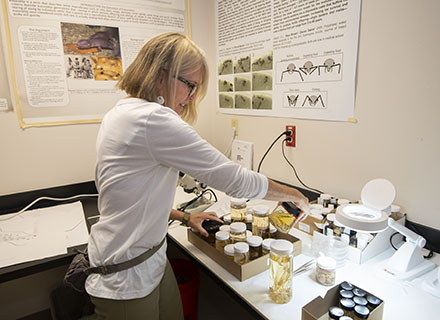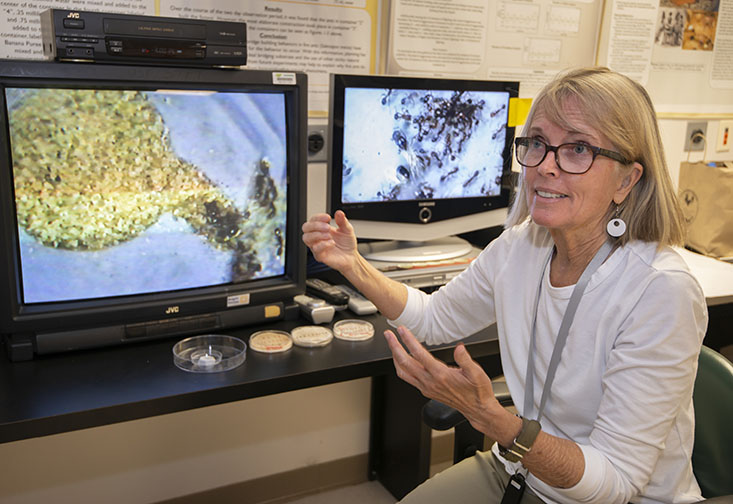Why do some fish spawn millions of offspring but whales give birth to just one at a time? Why do elephants spend decades caring for their young, while sea turtles abandon their offspring after laying eggs? And what do ant colonies and human societies have in common?
These are the questions probed by Biology Professor Deby Cassill in a scientific paper that presents an innovative model to classify animal species.
Cassill’s unique classification model, which was recently published in the journal Scientific Reports, looks at how pressures from natural selection, such as predation and resource scarcity, influence how mothers invest in offspring quantity and quality. She argues fish invest in large numbers of offspring when the likelihood their young offspring will be killed by predators is high. On the other hand, mammal mothers like whales and elephants provide extensive care to just one or a few offspring when the likelihood their young will starve during seasonal droughts is high.
The paper is Cassill’s first in an ambitious series that presents unifying theories in ecology, evolution and economics.
In the paper, Cassill presents what she calls a “maternal risk management model,” and establishes four categories that all animals can be grouped into. They are predation selection, scarcity selection, weak selection and convergent selection.
Some species, such as whales and elephants, have few offspring but spend their energy making sure those offspring survive to adulthood. Other species, such as fish, turtles and ants, have hundreds or millions of offspring, most of which will perish while still young and sterile. The number of offspring produced and the quality of care given to those offspring determine which natural selection category each species falls into.

Cassill classified 87 animal species into the maternal risk management model.
Whales fall into the scarcity selection category which favors extended maternal care in family units, rearing a few offspring to adulthood. These species may experience resource scarcity but are unlikely to experience predation. Ants and humans, on the other hand, fall into the convergent selection category. The dual pressures of death by predators and starvation during seasonal periods of scarce resources have fused ant families and human families into permanent societies marked by divisions of labor. Cooperative interactions among members occurs more often than competitive interactions.
Cassill began her career in biology as an ant expert. When the average person looks at an ant colony, he or she sees a bunch of pests, but for Cassill, these highly social insects are a lot more human-like than we tend to give them credit for.
“I see ants as a self-organizing social system, much like humans,” Cassill said. “For example, people have bosses, but how they get their jobs done depends on things like their personality, their mood, levels of hunger, sleep deprivation and local conditions. Ants do the same thing.”
For example, in a yet to be published study, Cassill found that some ants are workaholics while others sleep the day away.
While studying fire ant colonies in her lab, Cassill began to think differently about ant societies. Most ant biologists wondered why some ants are sterile altruists, giving up their ability to reproduce so they can feed and protect their selfishly fertile siblings, which leave the colony, mate and become queens of their own colonies.
Cassill asked a different question, which spurred her ambitious series of papers: “Why does a queen-mother produce a few selfishly fertile offspring, like most mammals do, and, at the same time, a huge number of disposable offspring, like fish do?”
Cassill wasn’t always this interested in ants. Her first degrees were a BA in psychology and an MPA in public administration. She worked in mental health for 20 years until one day she had an epiphany while watching a nature documentary. She decided she wanted to make nature documentaries, not watch them. She went back to school at age 40 and by 49 earned a B.S., M.S., and Ph.D. in biology from Florida State University.
In subsequent papers, Cassill will present a theory of sexual reproduction that suggests Earth was an all-female planet for billions of years, followed by a theory of evolution, which she presented at the Conference of the Animal Behavior Society in July. Finally, she will present a unifying theory of behavioral economics later this fall.
